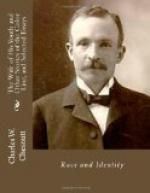Uncle Wellington slept later than usual the next morning, and the sunlight was pouring in at the open window of the bedroom, when his dreams were interrupted by the voice of his wife, in tones meant to be harsh, but which no ordinary degree of passion could rob of their native unctuousness.
“Git up f’m dere, you lazy, good-fuh-nuffin’ nigger! Is you gwine ter sleep all de mawnin’? I ‘s ti’ed er dis yer runnin’ ‘roun’ all night an’ den sleepin’ all day. You won’t git dat tater patch hoed ovuh ter-day ‘less’n you git up f’m dere an’ git at it.”
Uncle Wellington rolled over, yawned cavernously, stretched himself, and with a muttered protest got out of bed and put on his clothes. Aunt Milly had prepared a smoking breakfast of hominy and fried bacon, the odor of which was very grateful to his nostrils.
“Is breakfus’ done ready?” he inquired, tentatively, as he came into the kitchen and glanced at the table.
“No, it ain’t ready, an’ ’t ain’t gwine ter be ready ’tel you tote dat wood an’ water in,” replied aunt Milly severely, as she poured two teacups of boiling water on two tablespoonfuls of ground coffee.
Uncle Wellington went down to the spring and got a pail of water, after which he brought in some oak logs for the fire place and some lightwood for kindling. Then he drew a chair towards the table and started to sit down.
“Wonduh what ‘s de matter wid you dis mawnin’ anyhow,” remarked aunt Milly. “You must ‘a’ be’n up ter some devilment las’ night, fer yo’ recommemb’ance is so po’ dat you fus’ fergit ter git up, an’ den fergit ter wash yo’ face an’ hands fo’ you set down ter de table. I don’ ’low nobody ter eat at my table dat a-way.”
“I don’ see no use ‘n washin’ ’em so much,” replied Wellington wearily. “Dey gits dirty ag’in right off, an’ den you got ter wash ’em ovuh ag’in; it ‘s jes’ pilin’ up wuk what don’ fetch in nuffin’. De dirt don’ show nohow, ‘n’ I don’ see no advantage in bein’ black, ef you got to keep on washin’ yo’ face ‘n’ han’s jes’ lack w’ite folks.” He nevertheless performed his ablutions in a perfunctory way, and resumed his seat at the breakfast-table.
“Ole ’oman,” he asked, after the edge of his appetite had been taken off, “how would you lack ter live at de Norf?”
“I dunno nuffin’ ’bout de Norf,” replied aunt Milly. “It ’s hard ’nuff ter git erlong heah, whar we knows all erbout it.”
“De brother what ‘dressed de meetin’ las’ night say dat de wages at de Norf is twicet ez big ez dey is heah.”
“You could make a sight mo’ wages heah ef you ’d ‘ten’ ter yo’ wuk better,” replied aunt Milly.
Uncle Wellington ignored this personality, and continued, “An’ he say de cullud folks got all de privileges er de w’ite folks,—dat dey chillen goes ter school tergedder, dat dey sets on same seats in chu’ch, an’ sarves on jury, ‘n’ rides on de kyars an’ steamboats wid de w’ite folks, an’ eats at de fus’ table.”




